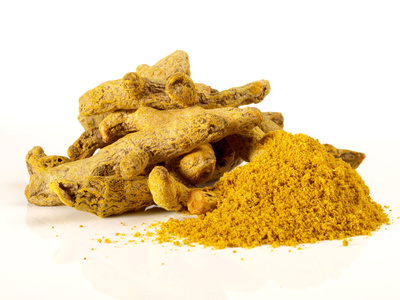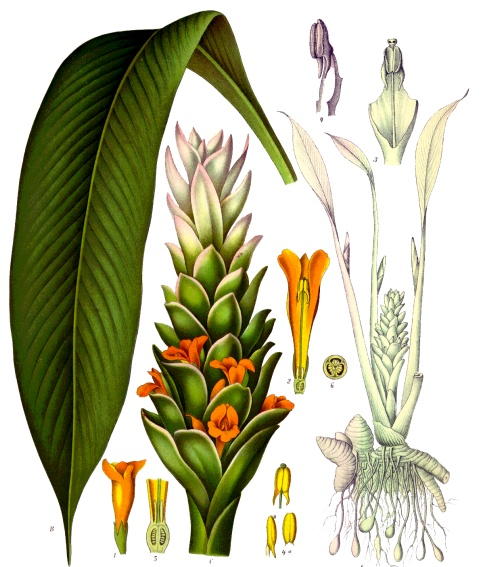|

          
Turmeric (Curcuma
longa L.)
 Parts used:
scalded, dried rhizome Parts used:
scalded, dried rhizome
Constituents:
curcuminoids, bitter principles, resin, volatile oil
Pharmacopoeia
Standard: dried rhizome should contain no less than 2.5 per cent curcumin
and no less than 20ml/kg of essential oil.
Actions:
anti-inflammatory, cholagogue, stomachic, antioxidant, antibacterial,
hypercholesterolaemic, mild anticoagulant.
Indications:
mild digestive disturbances, rheumatic conditions.
Applications:
Clinical trials have suggested that curcumin may have a more marked
anti-inflammatory effect than hydrocortisone, and it is believed to be more
antioxidant than Vitamin E. It is of value in the treatment of rheumatic and
arthritic conditions. Turmeric’s bitter action stimulates the appetite and
digestive secretions; it also increases mucus production, protecting the lining
of the stomach. Its cholesterol-lowering action means that it is a valuable
remedy for reducing the risk of heart attack or stroke.
Safety:
Contraindicated in biliary obstruction.
Dosage:
350mg three times a day
Bibliography
-
Al-Suhaimi EA, Al-Riziza NA, Al-Essa RA.
Physiological and therapeutical roles of ginger and turmeric
on endocrine functions. Am J Chin Med. 2011; 39 (2) :215-31. PubMed
PMID:21476200.
Alappat L, Awad AB.
Curcumin and obesity: evidence and mechanisms. Nutr Rev. 2010
Dec; 68 (12) :729-38. PubMed PMID:21091916.
Darvesh AS, Aggarwal BB, Bishayee A.
Curcumin and Liver Cancer: A Review. Curr Pharm Biotechnol. 2011 Apr 5;
PubMed PMID:21466422.
El-Moselhy MA, Taye A, Sharkawi SS, El-Sisi SF, Ahmed AF.
The antihyperglycemic effect of curcumin in high fat diet fed
rats Role of TNF-α and free fatty acids. Food Chem Toxicol. 2011 May; 49 (5)
:1129-40. PubMed PMID:21310207.
Garcia-Gomes AS, Curvelo JA, Soares RM, Ferreira-Pereira A.
Curcumin acts synergistically with fluconazole to sensitize a clinical
isolate of Candida albicans showing a MDR phenotype. Med Mycol. 2011 May 4;
PubMed PMID:21539505.
Hu B, Shen KP, An HM, Wu Y, Du Q.
Aqueous extract of Curcuma aromatica induces apoptosis and
G2/M arrest in human colon carcinoma LS-174-T cells independent of p53.
Cancer Biother Radiopharm. 2011 Feb; 26 (1) :97-104. PubMed PMID:21348775.
Khajehdehi P, Pakfetrat M, Javidnia K, Azad F, Malekmakan L,
Nasab MH, Dehghanzadeh G.
Oral supplementation of turmeric attenuates proteinuria,
transforming growth factor-β and interleukin-8 levels in patients with overt
type 2 diabetic nephropathy: A randomized, double-blind and
placebo-controlled study. Scand J Urol Nephrol. 2011 May 31; PubMed
PMID:21627399.
Khuwaja G, Khan MM, Ishrat T, Ahmad A, Raza SS, Ashafaq M,
Javed H, Khan MB, Khan A, Vaibhav K, Safhi MM, Islam F.
Neuroprotective effects of curcumin on
6-hydroxydopamine-induced Parkinsonism in rats: behavioral, neurochemical
and immunohistochemical studies. Brain Res. 2011 Jan 12; 1368:254-63. PubMed
PMID:20951685.
Kulkarni SK, Dhir A.
An overview of curcumin in neurological disorders. Indian J
Pharm Sci. 2010 Mar; 72 (2) :149-54. PubMed PMID:20838516; PubMed Central
PMCID: PMC2929771.
Luo F, Song X, Zhang Y, Chu Y.
Low-dose curcumin leads to the inhibition of tumor growth via
enhancing CTL-mediated antitumor immunity. Int Immunopharmacol. 2011 Apr 15;
PubMed PMID:21497674.
Mohankumar S, McFarlane JR.
An aqueous extract of Curcuma longa (turmeric) rhizomes stimulates insulin
release and mimics insulin action on tissues involved in glucose homeostasis
in vitro. Phytother Res. 2011 Mar; 25 (3) :396-401. PubMed PMID:20734343.
Mythri RB, Veena J, Harish G, Shankaranarayana Rao BS,
Srinivas Bharath MM.
Chronic dietary supplementation with turmeric protects
against 1-methyl-4-phenyl-1,2,3,6-tetrahydropyridine-mediated neurotoxicity
in vivo: implications for Parkinson's disease. Br J Nutr. 2011 Apr 8; PubMed
PMID:21473798.
Prakobwong S, Gupta SC, Kim JH, Sung B, Pinlaor P, Hiraku Y,
Wongkham S, Sripa B, Pinlaor S, Aggarwal BB.
Curcumin suppresses proliferation and induces apoptosis in
human biliary cancer cells through modulation of multiple cell signaling
pathways. Carcinogenesis. 2011 Feb 16; PubMed PMID:21325634.
Quiroga A, Quiroga PL, Martínez E, Soria EA, Valentich MA.
Anti-breast cancer activity of curcumin on the human oxidation-resistant
cells ZR-75-1 with gamma-glutamyltranspeptidase inhibition. J Exp Ther Oncol.
2010; 8 (3) :261-6. PubMed PMID:20734924.
Rajasekaran SA.
Therapeutic potential
of curcumin in gastrointestinal diseases. World J Gastrointest Pathophysiol.
2011 Feb 15; 2 (1) :1-14. PubMed PMID:21607160; PubMed Central PMCID:
PMC3097964.
Ramadan G, Al-Kahtani MA, El-Sayed WM. Anti-inflammatory and Anti-oxidant
Properties of Curcuma longa (Turmeric) Versus Zingiber officinale (Ginger)
Rhizomes in Rat Adjuvant-Induced Arthritis. Inflammation. 2010 Dec 1; PubMed
PMID:21120596.
Roy M, Sinha D, Mukherjee S, Biswas J. Curcumin prevents DNA damage and
enhances the repair potential in a chronically arsenic-exposed human
population in West Bengal, India. Eur J Cancer Prev. 2011 Mar; 20 (2)
:123-31. PubMed PMID:21332098.
Rungseesantivanon S, Thenchaisri N, Ruangvejvorachai P,
Patumraj S.
Curcumin supplementation could improve diabetes-induced endothelial
dysfunction associated with decreased vascular superoxide production and PKC
inhibition. BMC Complement Altern Med. 2010 Oct 14; 10:57. PubMed
PMID:20946622; PubMed Central PMCID: PMC2964550.
Seo SW, Bae GS, Kim SG, Yun SW, Kim MS, Yun KJ, Park RK, Song
HJ, Park SJ.
Protective effects of Curcuma longa against cerulein-induced
acute pancreatitis and pancreatitis-associated lung injury. Int J Mol Med.
2011 Jan; 27 (1) :53-61. PubMed PMID:21069254.
Shehzad A, Khan S, Shehzad O, Lee YS.
Curcumin therapeutic promises and bioavailability in colorectal cancer.
Drugs Today (Barc). 2010 Jul; 46 (7) :523-32. PubMed PMID:20683505.
Shehzad A, Ha T, Subhan F, Lee YS.
New mechanisms and the anti-inflammatory role of curcumin in
obesity and obesity-related metabolic diseases. Eur J Nutr. 2011 Apr; 50 (3)
:151-61. PubMed PMID:21442412.
Singh M, Singh N.
Curcumin counteracts the proliferative effect of estradiol and induces
apoptosis in cervical cancer cells. Mol Cell Biochem. 2011 Jan; 347 (1-2)
:1-11. PubMed PMID:20941532.
Taylor RA, Leonard MC.
Curcumin for inflammatory bowel disease: a review of human studies. Altern
Med Rev. 2011 Jun; 16 (2) :152-6. PubMed PMID:21649456.
Wang Y, Rishi AK, Wu W, Polin L, Sharma S, Levi E, Albelda S,
Pass HI, Wali A.
Curcumin suppresses growth of mesothelioma cells in vitro and in vivo, in
part, by stimulating apoptosis. Mol Cell Biochem. 2011 May 19; PubMed
PMID:21594647.
White B, Judkins DZ.
Clinical Inquiry Does turmeric relieve inflammatory
conditions?. J Fam Pract. 2011 Mar; 60 (3) :155-6. PubMed PMID:21369559.
Wickenberg J, Ingemansson SL, Hlebowicz J.
Effects of Curcuma longa (turmeric) on postprandial plasma glucose and
insulin in healthy subjects. Nutr J. 2010 Oct 12; 9:43. PubMed
PMID:20937162; PubMed Central PMCID: PMC2964546.
Wilken R, Veena MS, Wang MB, Srivatsan ES.
Curcumin: A review of anti-cancer properties and therapeutic
activity in head and neck squamous cell carcinoma. Mol Cancer. 2011 Feb 7;
10:12. PubMed PMID:21299897; PubMed Central PMCID: PMC3055228.
Wong TF, Takeda T, Li B, Tsuiji K, Kitamura M, Kondo A,
Yaegashi N.
Curcumin disrupts uterine leiomyosarcoma cells through AKT-mTOR pathway
inhibition. Gynecol Oncol. 2011 Jul; 122 (1) :141-8. PubMed PMID:21450334.
Xie L, Li XK, Takahara S.
Curcumin has bright prospects for the treatment of multiple sclerosis. Int
Immunopharmacol. 2011 Mar; 11 (3) :323-30. PubMed PMID:20828641.
Yiu WF, Kwan PL, Wong CY, Kam TS, Chiu SM, Chan SW, Chan R.
Attenuation of Fatty Liver and Prevention of Hypercholesterolemia by Extract
of Curcuma longa through Regulating the Expression of CYP7A1, LDL-Receptor,
HO-1, and HMG-CoA Reductase. J Food Sci. 2011 Apr; 76 (3) :H80-9. PubMed
PMID:21535835.
Zhong F, Chen H, Han L, Jin Y, Wang W.
Curcumin attenuates lipopolysaccharide-induced renal inflammation. Biol
Pharm Bull. 2011; 34 (2) :226-32. PubMed PMID:21415532.
  
|

 Parts used:
scalded, dried rhizome
Parts used:
scalded, dried rhizome










